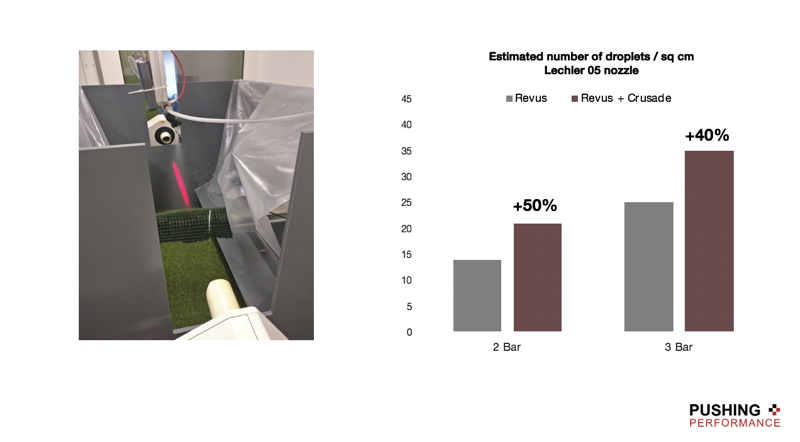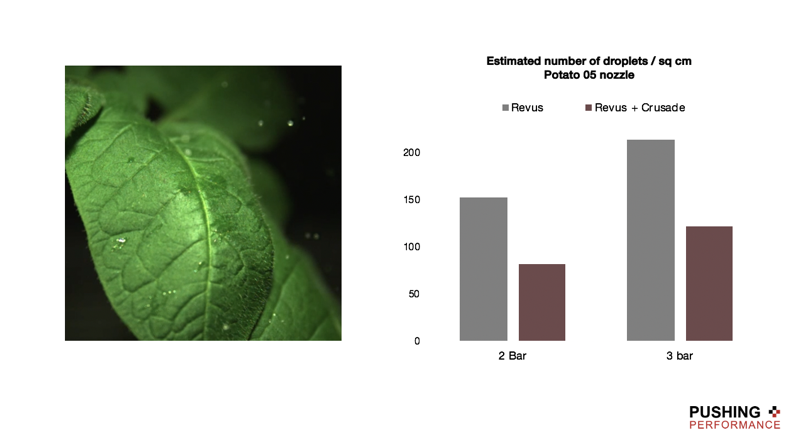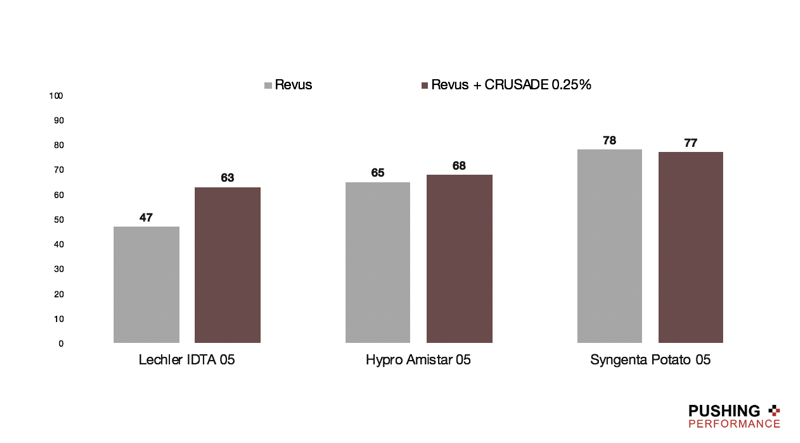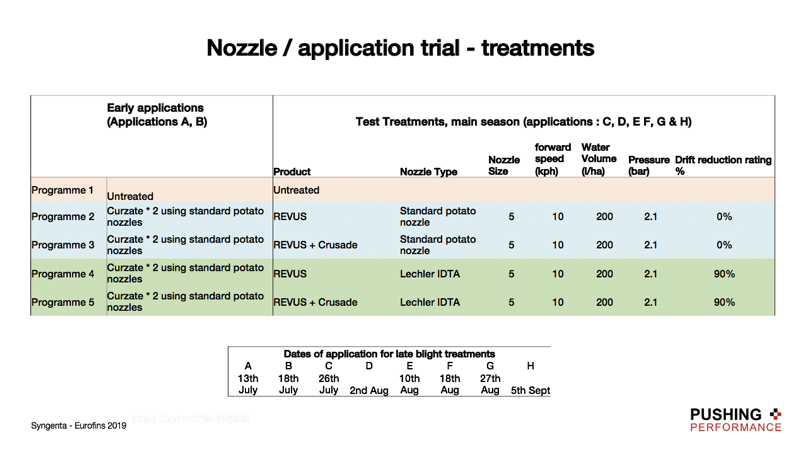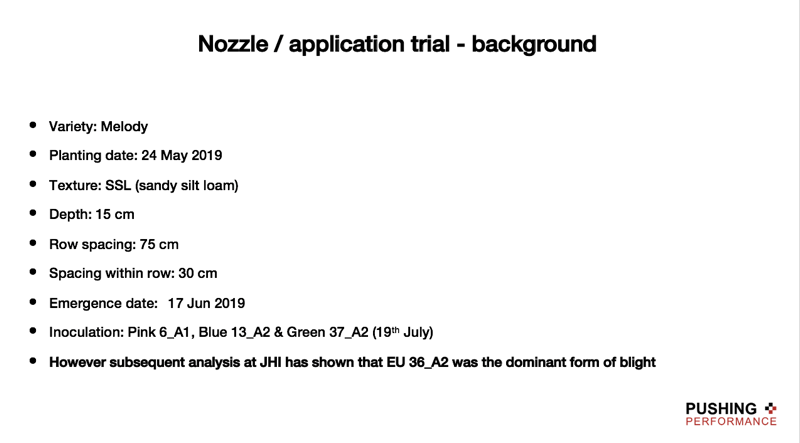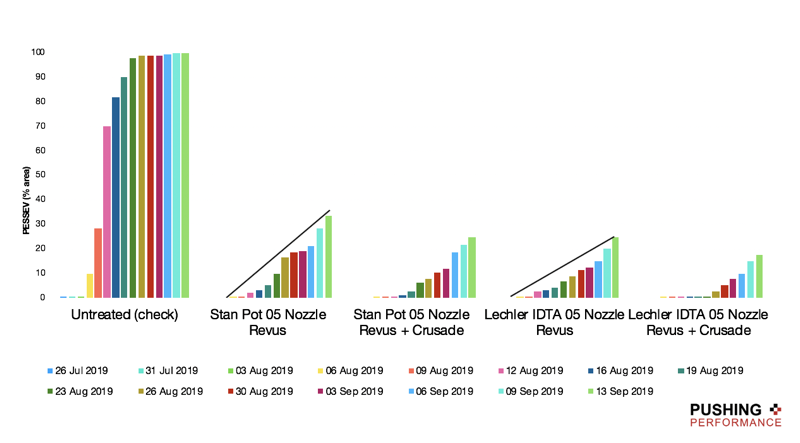Maximise coverage, tighten intervals with Crusade
With many potato crops now entering the period of stable canopy, alongside the return of wetter humid weather, blight risk to crops is high. The aggressive 37_A2 genotype which infected 27% of Fight Against Blight samples tested in 2019, up from 17% in 2018, further heightens the blight risk to crops, where even the best fungicides will need help to maximise performance.
Crusade is a specialist drift retardant designed specifically to help maximise fungicide dose and deposition on the potato crop and provide full canopy protection by modifying droplet size and distribution. This makes Crusade a vital addition to ensure fungicide sprays are both timely and targeted for maximum protection.
Fig. 1. Potato blight population change demonstrates increasing threat from aggressive 36_A2 and 37_A2 genotypes

Reasons to integrate Crusade
Maximises protection against aggressive blight strains
With a changing blight population (see Fig. 1) and increasingly aggressive genotypes, achieving full fungicide coverage is critical to safeguard crops. The newest highly aggressive blight strains 37_A2 and 36_A2 join 13_A2 and 6_A1 in being able to rapidly exploit any weaknesses in spray coverage within the canopy, where even the strongest fungicides can have weak spots due to poor coverage. Their ability to produce spores earlier in the season and in greater numbers intensifies the threat to crops and it is now even more crucial that growers achieve consistent spray coverage across all leaf surfaces. Crusade is designed to maximise fungicide coverage to the full crop canopy, preventing scattered infection across the crop and into the tubers.
Helps penetrate crop canopies with fungicide
As we go into July, crop canopies are closing fast and becoming harder to penetrate with fungicide. The canopy structure of the potato crop provides an additional challenge when it comes to delivering blight fungicide to the lower leaves. While full crop coverage with a fungicide is vital to prevent scattered infection, the ‘umbrella-like’ structure of the canopy – a series of interlocking leaves – makes this very difficult to achieve. Leaves are good collectors of vertical moving spray in the upper canopy but the leaves and stems lower down in the canopy can be very hard to reach, increasing the risk of tuber blight. Crusade increases the proportion of droplets in the “optimum” size category for drift reduction and target leaf retention, that means fungicide sprays are able to penetrate to the lower canopy as well as protect upper leaves and stems.
How?
With spray droplet mechanics it is possible to influence where in the crop canopy the spray reaches, and its all down to droplet size. Crusade creates the perfect droplet size by reducing droplets at either end of the spectrum – it coalesces ultra-fine droplets (<100 microns prone to drift) into small droplets, and splits very coarse droplets (prone to run off or bounce from the leaf) into smaller droplets. With Crusade, such coarser droplets still have momentum to reach the lower canopy, but their smaller size means they can still be retained to protect from invading blight spores.
Helps maintain tight spray intervals
Maintaining blight sprays every 7 days through to burndown is essential to keep the potato crop sufficiently protected, but challenging application conditions jeopardise this when it becomes just too windy to spray. Its a challenge because not only is the dose and distribution on the crop compromised, when sprays have to be delayed, fungicides can start to run out of steam putting the crop at risk.
Syngenta application trials have shown that even on a perfect spray day, with an average wind speed of 1.2 metres/second (2.7 mph), the actual wind speed can vary from 0.1 to 4.3 m/second (0.22 to 9.6 mph). Such gusts of wind, even within the width of the spray boom have the potential to leave patches of crop under-dosed with fungicide and therefore exposed to infection.
Crusade substantially reduces drift, with visible drift reduction frequently cited by potato growers, allowing tight spray intervals to be maintained. Work conducted by Syngenta has shown that by physically altering the properties of individual spray droplets, Crusade reduces the number of ultra-fine droplets (<100 microns) that are most susceptible to drift, as well as reducing the number of very coarse droplets that are susceptible to bounce or rolling off the leaf.
Effective with flat fan and low drift nozzles
All nozzles produce a wide range of droplet sizes – different nozzle types and design can alter the small and large droplets and the proportion in each category. Crusade has been designed to reduce droplets at either end of the spray spectrum – it coalesces ultra-fine droplets into small droplets so they are less prone to drift, and it splits very coarse droplets (a feature of low drift nozzles) into smaller droplets so they are less prone to bounce or run-off from the leaf. The result is an ideal droplet that provides maximum coverage for maximum protection.
Work at Syngenta has shown that Crusade helps to maximise coverage and blight protection with different nozzles
Convenient and flexible
Crusade can be applied throughout the life of the crop, there are no timing restrictions and it is compatible with all fungicides, insecticides and foliar feeds. For more information on the products Crusade has been tested with and guidance on how to use, please request a copy of our product guide on the Crusade product page.
Tested and proven independently
Crusade has been rigorously tested and proven in SRUC, Eurofins, Syngenta and BASF blight trials over the last 5 years with a range of fungicides, where it has been shown to maximise blight control and blight free yield. Incorporating Crusade into blight programmes now, is recommended to help maximise protection and prevent blight infection.
Fungicide coverage needs to be improved. A key feature of Crusade is the maximisation of blight control with a wide range of different fungicide active ingredients.
Dr. Ruairidh Bain, SRUC








